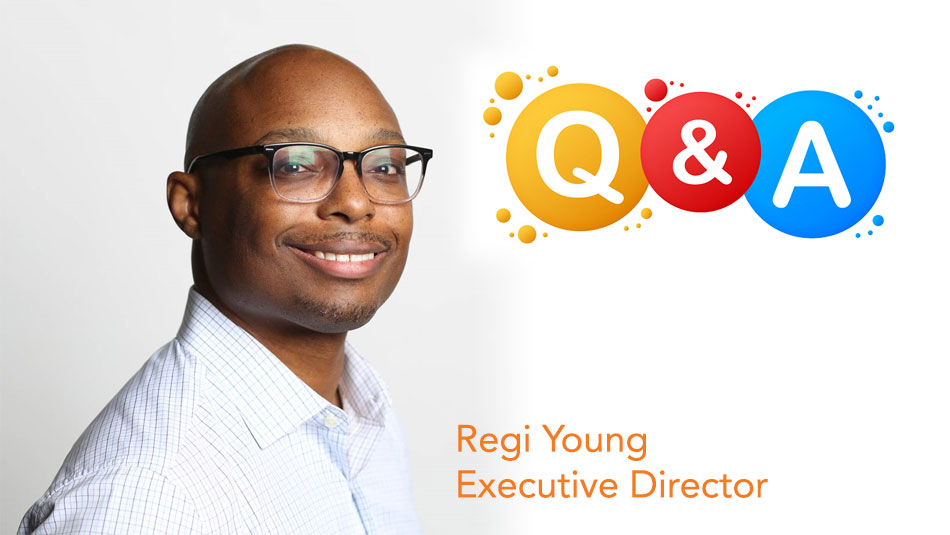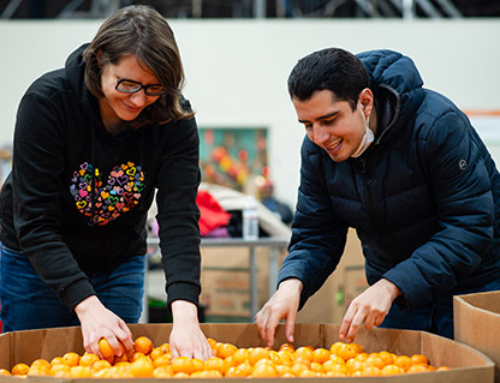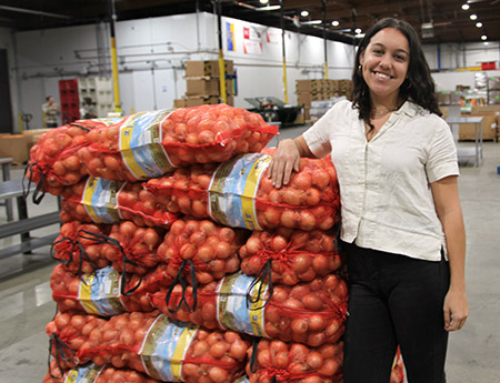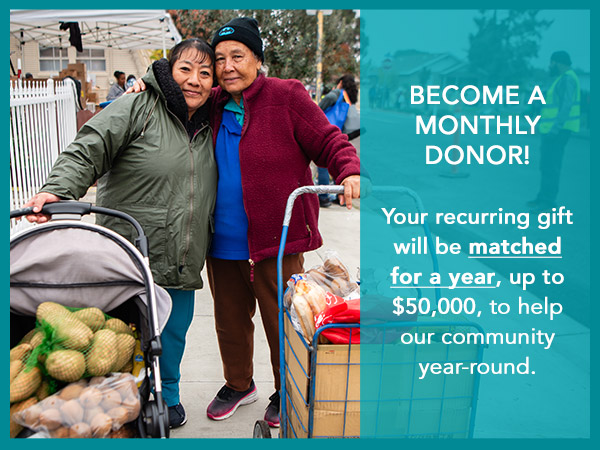This month ACCFB is excited to welcome our new Executive Director, Regi Young! Regi joins us from Houston Food Bank, where he was Chief Strategy Officer.
Welcome, Regi! Tell us a bit about yourself.
Well, I was born in Inglewood, California and grew up in Houston. I come from a large family with members all over the country, including in the East Bay.
I’m a foodie that also enjoys watching movies, playing sports, and digging for vinyl when traveling to new cities.
My wife and I have a talented four-year-old daughter that currently aspires to be a gymnast and recently told me that Simone Biles was “okay” after viewing a video of her doing a double layout with a half-twist (it took me a while to find the name of that move).
What attracted your to ACCFB?
Simply put, ACCFB is amazing! I’ve been in the Feeding America network for 11 years, and I’ve only heard great things about this organization.
ACCFB is known nationally to be creative, innovative, and community-centric in its approach to service, which are all attributes that I value.
(Former Executive Director) Suzan Bateson described for me recently ACCFB’s unique position to demonstrate to other food banks the impact our sector can have on addressing the root causes of poverty. This is a belief that I share and look forward to working with staff, partners, and neighbors to realize.
ACCFB and Houston Food Bank collaborate quite a bit. What are some of the biggest differences and similarities you see between these two food banks?
The main difference is their service areas. ACCFB’s service area is unique due to the immense number of micro-communities that exist in Alameda County. HFB’s service area is more spread out and consists of 18 counties that range in population from less than 2,000 to over 4 million.
Both organizations are well respected by their peers, have a long history of success, and are in regions that are very culturally and ethnically diverse. Suzan and her counterpart Brian Greene in Houston have both created spaces in their respective organizations for staff to rethink what it means to be a food bank and its responsibility to the community they serve. (Editors note: Brian and Suzan received Feeding America’s Jon van Hengel award in successive years!)
Yet, the biggest similarity that I see at this point is that they are both supported by a phenomenal network of community stakeholders that truly align with their missions and values.
This last year has presented challenges unlike anything ACCFB has faced in our 36 years in business. What is something you’ve taken away from the experience of the last year?
I recall sitting in our home in Houston earlier this year during “the freeze” without any heat or running water thinking, “how did this happen?” A few weeks later, I sat in that same room with repaired pipes and walls as if nothing ever occurred. This was not the experience of many of our neighbors.
The past 18 months has been a consistent reminder of the endemic inequities that exist within our society and how they negatively impact the most vulnerable populations. For me the current challenge is to ensure that these inequities remain in plain sight so that they can no longer be ignored or dismissed.
You’ve undoubtedly spent a lot of time learning about our history, mission, current strategy and so on. Tell us about your own vision for ACCFB and the future of food banking.
This is a pivotal moment in food banking. For too long, food banks approached the issue of food insecurity in isolation of other community stakeholders. Food was our problem to solve!
Today, those lines are being blurred by forward thinking organizations like ACCFB that understand that food alone will never resolve the issue of food insecurity. Families that come to pantries often have a variety of other unmet needs such as housing, healthcare, and employment that if not addressed, makes it highly unlikely that they will become food secure and no longer need our services. To this effort, we must focus on addressing the root causes of food insecurity – including racism and poverty – and strengthen relationships with community members, our partner network, and organizations from various sectors to leverage our collective resources, expertise, and influence to support the goals of the people we work with and for.
Full transparency, Regi: We’re foodies too! We can’t let you go without asking about your favorite food-related memory?
My paternal grandparents are from a city called West Monroe, Louisiana, which is about 2 hours away from where I went to college. As a student, I used to occasionally mention that my grandmother made the best biscuits in the South.
One weekend, two of my classmates came down with me to West Monroe, and within the hour my entire family started to pile into my grandparents’ house because they knew my grandmother would be making me my favorite dish. Today, my classmates are still telling the story of that weekend in West Monroe and those legendary biscuits…
Have you been warned about how legendary ACCFB potlucks can be? (That is, when we can gather in person again) We hope you brought the biscuit recipe with you!





